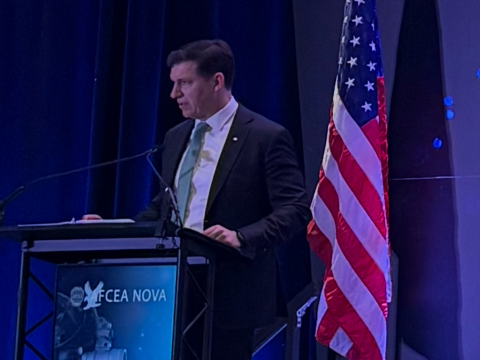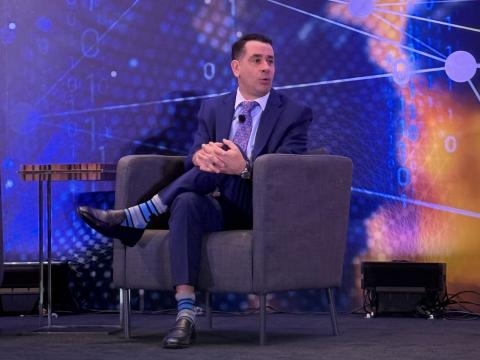Incoming: Entrepreneurship Can Make America Stronger
Much debate has taken place recently on the topic of American “greatness.” While I believe this country remains great today, I also believe it has lost some of its momentum for a number of reasons, including a struggling economy.
Much debate has taken place recently on the topic of American “greatness.” While I believe this country remains great today, I also believe it has lost some of its momentum for a number of reasons, including a struggling economy. Wages are not climbing, consumer spending is stagnant, and the national debt keeps growing. We need to reinvigorate the middle class with more opportunities for higher-paying jobs so that Americans feel confident and prosperous again. Those opportunities exist, but unlike the last century, more will come from small businesses than big businesses.
According to U.S. Small Business Administration Office of Advocacy reports, corporate America has been downsizing. Since 1990, big business has eliminated 4 million jobs, while small business has added 8 million new ones. The country now has 28 million small businesses, and they account for 54 percent of all U.S. sales. Also, small businesses provide 55 percent of all U.S. jobs and 66 percent of new jobs created since the 1970s. Further, as the number of small business startups has grown, their rate of failure has declined.
When I was growing up, my parents’ generation wanted a better life for us, and we baby boomers got it. My father was trained as a machinist in the U.S. Army. After completing his enlistment, he leveraged those skills and worked in a factory back home. The pay was decent, benefits fair and overtime available. He was able to remain in the occupation long enough to retire with a pension that lasted throughout his and my mother’s lives.
I had an aunt who was ahead of her time: She labored full time in a factory while also working at home and raising three children. She put in a total of 75 years at a fine china company before retiring. I remember turning over many plates in restaurants around the world, proudly reading the brand and assuming its china and other “Made in the USA” goods would be the gold standard forever. Unfortunately, that was not the case. That particular factory, established in 1871, closed its doors in 2009.
I suspect many Americans have similar stories of once-abundant blue-collar jobs that have dried up in their hometowns, either outsourced to other countries or replaced by technology. The model of big businesses employing a breadwinner for life rarely applies anymore.
So how do we set up the next generation for success? We can begin by generating desired jobs in relevant, high-demand fields. These jobs will come from the source that made our country so great in the first place—innovative entrepreneurs with pride of ownership, bolstered by the competitive American spirit. But we must foster this spirit again.
I would like to see schools provide more emphasis on practical courses that teach the fundamentals of small business and entrepreneurship. We need them to focus on the skills that individuals need to create and deliver high-quality products. Banks and community planners can help startups identify emerging market needs to further enhance opportunities for success. Finally, we need more mentors who provide guidance to small-business owners on the details of starting a business and growing it. Today, the government has a program encouraging large organizations to form mentor-protégé relations with small businesses. This program should be expanded. At the community level, Rotary Clubs have experienced business leaders who can serve as advisers to startups.
At all levels, government plays a critical role. While government has made some effort to support small businesses, more needs to be done. When I retired from the Air Force, my primary goal was to produce a quality product in the United States and to create jobs. My family and I planned and financed a small startup in which some still are working diligently today. Equally important, we have put architects, construction workers, electricians and others to work along the way. Many of these subcontractors are self-employed. The journey has been hugely rewarding, but the challenges we faced from many government agencies were complicated, time-consuming and expensive. State and local governments should look at those states with the highest job creation statistics to gain insights and then adopt similar business-friendly policies and regulations.
Our country’s economy was built by pioneers with vision, determination and a willingness to take risks. Every city in the nation reflects evidence of an entrepreneur who realized a dream. But the shifting demands of the global economy mean few Americans can expect to work in a big business for life. Fortunately, innovative entrepreneurs are stepping forward and starting their own small businesses, creating jobs and wealth. By all accounts, we are headed in the right direction, with the next generation redefining “Made in the USA” brands and ways to produce them. Entrepreneurship and small business is the new engine making a strong America even stronger. I am happy to be along for the ride.
Lt. Gen. Mike Basla, USAF (Ret.), the former chief of information dominance and chief information officer of the U.S. Air Force, is a senior vice president and Air Force client executive for CACI. The views expressed are his alone and do not necessarily reflect the views of CACI, the U.S. Air Force or AFCEA International.




Comment
Make America Stronger
Lt. Gen. Mike Basla, USAF (Ret.) has put his finger on what has always been at the core of American greatness or exceptionalism and what can still help us be stronger than ever before. We cannot drift away from teaching our young the essence of leadership and entrepreneurship, or the historical lessons that inform our human character and give us the ability to dream, innovate, and take risk. Merely trying to catch up to the Math and Science test scores of Asia is not a vision and will not lead us to anything but a "participation trophy". We know we can be stronger than that once again.
Thank you sir for such a thoughtful piece.
snicker
blows my mind to read comments about "entrepeneurship" from a senior VP at an enormous defense contractor. per usual, the Gen. thinks government is key to the solution, rather than just being in the way. that's because feeding off Uncle Sam is CACI's entire business model. entrepeneurship, my a**.
Comments